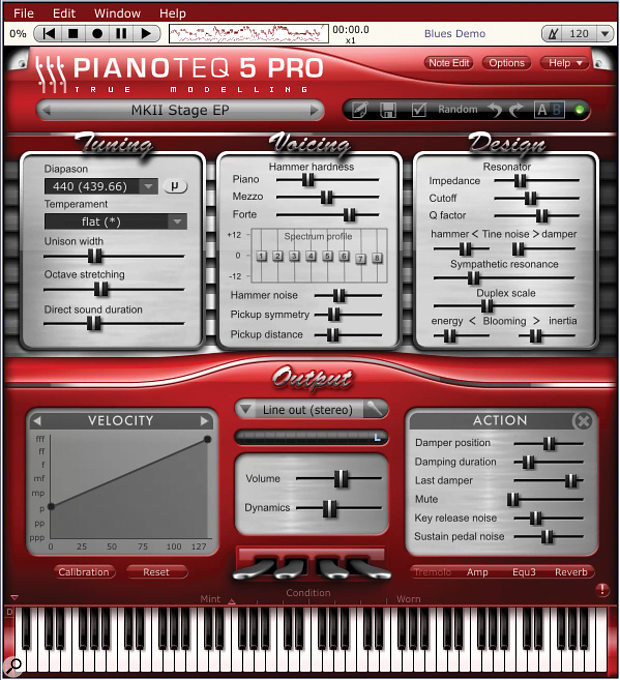The progress of Modartt’s intriguing Pianoteq virtual instrument has been well charted in these pages, starting with my evaluation in January 2007 and continuing through Robin Bigwood’s series of articles, which culminated in his very positive review of Pianoteq 5 in April 2015. Over that time, the makers added an array of contemporary and historic models, expanding the instrumentation with harpsichords, electric keyboards, chromatic mallets and exotica such as celeste, cimbalom, tubular bells and carillon.
Modartt have now unleashed more Pianoteq instruments, the most recent being Vintage Tines MkII, a beautifully modelled electric piano seemingly based on the Rhodes MkII Stage 73. Apart from the excessive amount of sustain-pedal noise featured in some presets (which can easily be turned off), this instrument sounds great. Its fully adjustable, bell-like ‘tine noise’ attack is more realistic than that of Pianoteq’s Vintage Tines MkI instrument, and the overall tone is clear, incisive and sustaining. A set of classic effects (stereo tremolo, wah, phasing, distortion and so on) enhances the piano’s hip retro appeal.
Pianoteq’s very creditable Hohner Clavinet is now joined by emulations of the Hohner Electra-piano, Pianet T and Pianet N. These overlooked electro-mechanical gems date from the early ’60s, with the Pianet N (my favourite) popping up on classics such as ‘I Am The Walrus’ and ‘She’s Not There’: I’m happy to say Modartt have totally nailed its distinctive warm, friendly and reedy timbre. I also enjoyed the Electra-piano, which sounds like a cross between a Rhodes and a Wurlitzer, and the delightfully ‘tonky’ Rhodes–like attack of the Pianet T’s middle register. All now benefit from a seven-octave range and sustain-pedal capability. (See Huw Rees’ SOS June 2016 article for more information on Hohner keyboards.)
While Pianoteq’s Steinway D4 Concert Grand sounds big and imposing, I find the lyrical tone of the new Model B Grand Piano, modelled on the Hamburg Steinway B, better suited to intimate settings and ballads. Its ‘Dreamy’ preset has a nice, floaty atmosphere, and overall it’s an ideal instrument for reflective improvising and moody film cues. Modartt’s Concert Harp would also be a useful tool for media composers: this full–range instrument has a pleasantly well defined, close–up sound, a soft-attack mode for glissando sweeps and a fabulous set of delicate octave harmonics. My only criticism is the lack of a dedicated control to shorten the decay of ringing open strings.
Our final new Pianoteq entry, the grandly-named Harpsichord Hans Ruckers II, spans a tonal range from thunderous, crashing bass octaves to an elegant four-foot stop with a delightfully precise, steely plucked attack. Absolutely superb. All the abovementioned instruments can be bought separately, and some are available in cost-effective instrument packs. My enthusiasm for Pianoteq remains undimmed: it’s a pure-sounding, eminently playable, latency-free, ultra system-friendly virtual instrument which I’m sure has more goodies in store.
Instrument packs €49; Pianoteq licence required.

